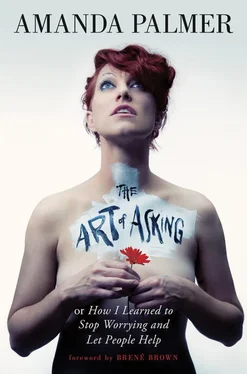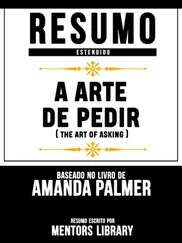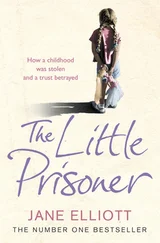We tried to set up an arm of The Brigade in every city; you just had to volunteer over email—to do basically anything—and I’d grant you a guest-list space. We paid with the usual currency we had on hand: T-shirts, CDs, backstage beer, shout-outs from stage, tickets, love. I announced any local shows or art openings from stage if a member of The Brigade had something coming up.
In my free time, I tried to hunt down potentially interesting local performers, which was becoming easier now that Google existed and you could search for “insane cabaret performers detroit.” If an extra performer we’d reached out to wanted to get paid for the gig, those decisions were random and made on the fly:
We’d love to come, but we’re all professionally trained ballerinas, so we need backstage space to warm up , a voice said over the phone as we barreled down the highway to our next stop. Then we set ourselves on fire to songs by Led Zeppelin and AC/DC, mostly all classic rock… but all the dancers live at least an hour outside Detroit and we each need fifty dollars for gas and there will be at least five or six of us .
I put my hand over the mouthpiece of my phone and turned to Brian, who was driving.
They’re ballerinas who set themselves on fire to AC/DC but they need money for gas , I whispered.
For gas to set themselves on fire? Brian asked.
No, gas for the car .
HIRED! Brian said, banging the steering wheel.
We’re totally down , I said into the phone. You sound amazing. We can do like two hundred bucks—however many ballerinas that buys us. Just grab the cash from me after the show. And for god’s sake, talk to the club about the local fire laws. Do you have a website I can post?
Yes, it’s Tutu Inferno dot org. Spelled T-u-t…
I got it, I got it. See you Sunday .
In the streets of Edinburgh one year, I ran into a busking duo called Bang On! who played percussion on junk and household objects. Our UK tour was already packed with opening stage acts, but I asked if they’d like to try a new experiment: to set up and play on the theater floor as people were filing in before the show, then pass the hat. They said they’d give it a shot. I came out half-dressed and half-made-up for the show, watched and applauded them, and then made a personal plea to the crowd, letting them know that these people had come to entertain out of the goodness of their own hearts and weren’t getting otherwise paid. The money poured in, and something about asking everybody—on the spot—to reach into their pockets to help these two artists changed the energy of the room. It turned the random crowd into a real community. It also meant that nobody ever came late to our concerts—the preshow entertainment started being too interesting to miss.
Other bands pissed off clubs because they would trash the dressing room and steal liquor from the stockroom. We pissed off clubs because the half-naked marching band outside the venue would elicit noise complaints, or because someone would leave a glittery cage of trained mynah birds in the hallway, thus blocking the bar-backs’ path to the ice machine.
• • •
Neil didn’t dance. He wasn’t much of a drinker. He didn’t like hanging out in loud bars unless he had a book.
These things worried me.
But I was infatuated with his accent.
Say it again! I’d plead. Say tomato!
ToMAHto , he would deadpan, as if not enjoying this game at all.
I would squeal with glee. Say it again!
ToMAHto .
Shivers. It also worked with “schedule” and “banana,” and my very favorite: “wastepaperbasket.” One night I asked him to say it fifteen times. It didn’t get old.
Late in bed that same night, when I wasn’t expecting it, he surprised me.
ToMAHto . He whispered into my ear. SHEdule .
I half opened my eyes and whimpered with pleasure. And then, sounding very pleased with himself, he murmured:
BaNAHna .
• • •
The label helped us a lot in the early days. They went right to work making the band better known around the world, especially in Europe and Australia. What we’d been doing at a grassroots level had been effective, but it was slow. They worked fast. They got our music into stores, onto the radio and television. Soon we were flying everywhere, hopping on and off tour buses, doing interviews with bigger and bigger magazines.
We’d heard that they had a reputation for squeezing bands dry and only caring about the bottom line, but that wasn’t what we noticed, not at first. What quickly became apparent to us was that they didn’t understand how to treat—or rather, not treat—our fans. It seemed simple enough to me: you work hard, you play for your crowd, you talk to, communicate with, hug, and connect with them in every possible way, and in turn, they support you and convert their friends into the fold. That’s when music works best, when people use it to commune and connect with one another. Simple.
However, the label thought that we could somehow be mega-launched into the echelon of indie bands that were blowing up and selling tons of records out of the gate around that time: The Hives, The Shins, The Vines, The Strokes. We couldn’t: we were too cult-y, our name wasn’t short enough, and we didn’t actually feel hip or destined for hipness. We functioned best as part of a tight community that grew slowly, fan by fan. If it grew too fast, it wouldn’t work. It’d be like suddenly pouring too many new unfamiliar fish into an aquarium and screwing up the ecosystem.
The label and the band had different ideas about what “enough” meant.
What was enough to make the band “successful”? We weren’t starving. We could pay our rent. What did we actually… need ? To live? To be happy?
• • •
If you’re looking for help, it stands to reason that you’re going to start looking among the people most able to give you the help you need. When your house is on fire, you don’t call the fire department from seven towns over—you call the outfit down the street. They’re the most equipped to help you.
One of the strategies the label employed that always baffled me was wanting us to focus all the energy on casting the net elsewhere, to attract strangers, while ignoring our established fanbase. I loved new people. Of course. But it seemed insane to jeopardize the current relationships to find them.
The label’s theory probably followed some kind of cutthroat marketing maxim: once you’ve got a customer, you’ve got ’em. Move on to the next victim. Except that our driving motivation was to hang out with and bond with our small group of existing customers, whom we’d worked so hard to find in the first place. We knew from experience that our evolving friendship was slowly but surely bringing new people into the fray. Making fans that way—in person, one by one, as they were won over at our shows by our harder-core fans—seemed more effective than going out there and hollering on the radio to a group of unknowns, hoping to be heard by someone who might like us. Our way felt more like getting introduced to a person by a mutual friend, personally, at a bar over drinks. It felt real.
When I reflect on the last fifteen years of my life in music—all the touring, talking, late-night signing, blogging, twittering, couchsurfing, crowdsurfing, and all other variety of eye-to-eye, soul-to-soul, hand-to-hand connection I’ve shared with the members of my crowd—I see it as a net.
It has to start with the art. The songs had to touch people initially, and mean something, for anything to work at all. The art, not the artist, is what fundamentally draws the net into being. The net was then tightened and strengthened by a collection of interactions and exchanges I’ve had, personally, whether in live venues or online, with members of my community.
Читать дальше












